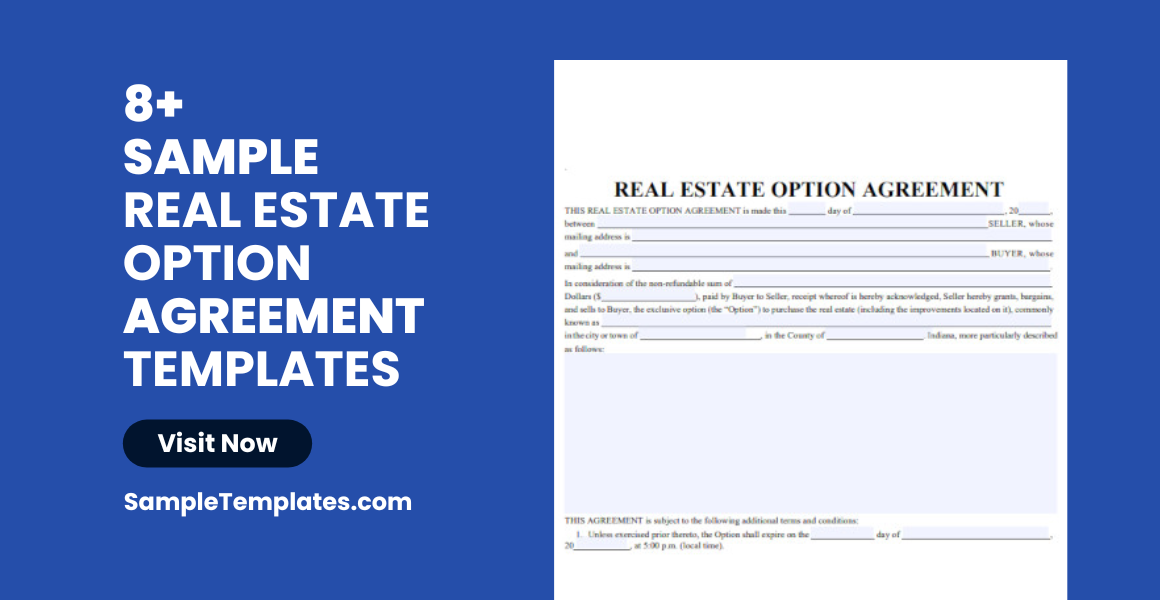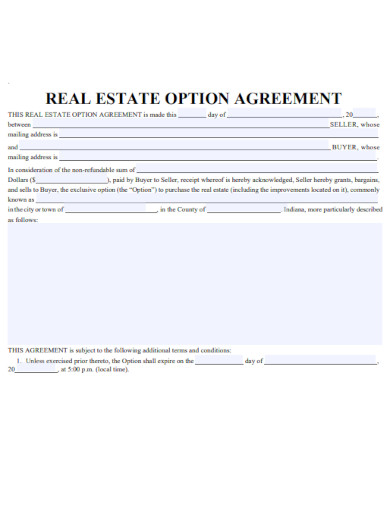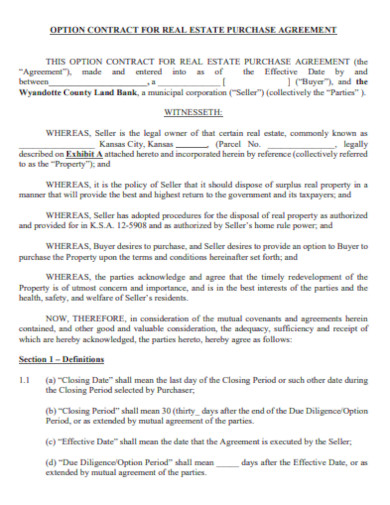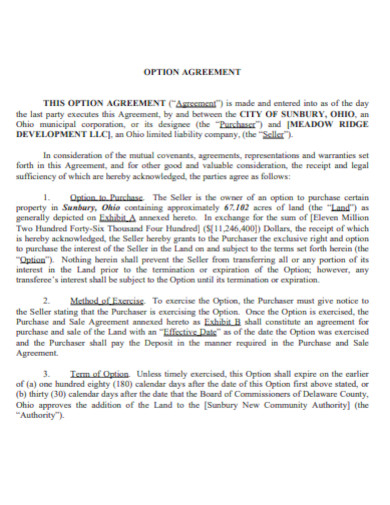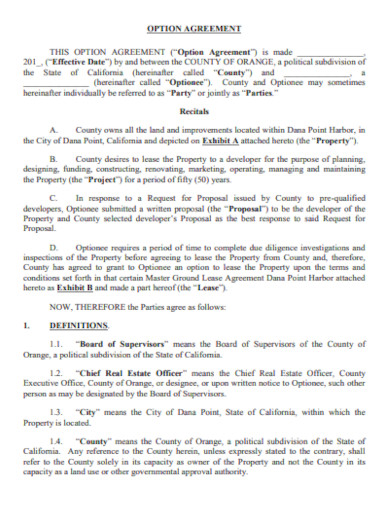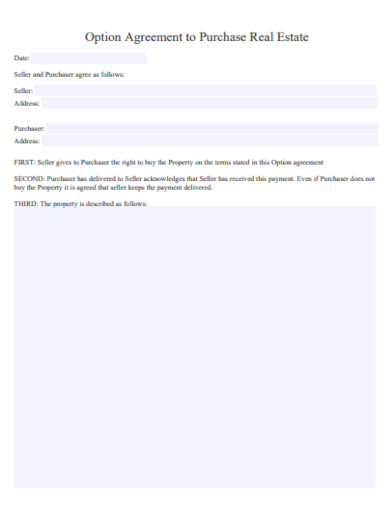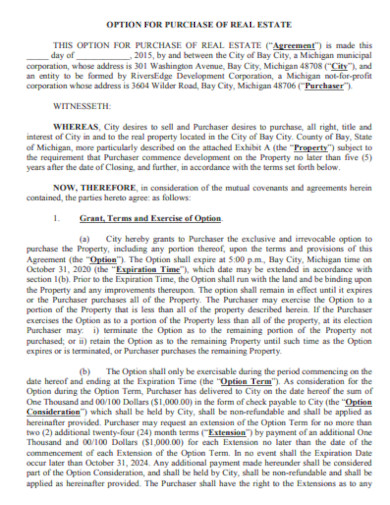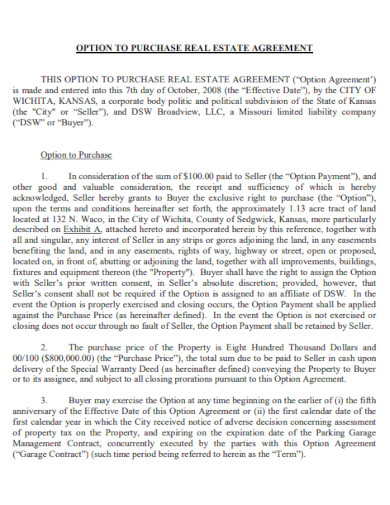8+ Real Estate Option Agreement Samples
1. Sample Real Estate Option Agreement Template
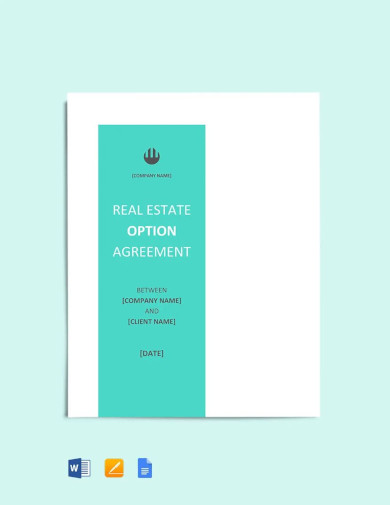
2. Sample Real Estate Purchase Option Agreement Template

3. Sample Real Estate Option Agreement Document
4. Sample Option Contract for Real Estate Purchase Agreement
What is Real Estate Option Agreement?
An option agreement in real estate is a sample contract between a buyer and a seller that gives the buyer the exclusive, no-obligation right to purchase property at a later date. This type of agreement is particularly useful for buyers who need time to secure financing, conduct due diligence, or obtain necessary permits or zoning changes before committing to the purchase.
Understanding the Mechanics of an Option Agreement
At its core, an option agreement involves two main elements: the option fee and the option period. The option fee is a payment made by the buyer to the seller for the exclusive right to purchase the property. This fee is typically non-refundable, but it may be applied to the purchase price if the buyer decides to execute the purchase. The option period is the timeframe during which the buyer must decide to exercise their purchase right.
Benefits for Buyers and Sellers
For buyers, the advantage is clear: they can lock in a purchase price and terms while they prepare for the actual transaction. Sellers benefit by receiving the option fee and by having a potential sale lined up, which can be particularly appealing if the market is slow or if immediate cash flow is needed. You can also see more templates like Option to Buy Agreement Samples.
Key Components of a Real Estate Option Agreement
Every option agreement should clearly outline several essential elements to ensure clarity and enforceability:
- Option Fee and Payment Terms: The amount paid by the buyer for the option and the terms of payment.
- Purchase Price: The agreed-upon price for the property if the buyer exercises the option.
- Option Period: The timeframe during which the buyer can exercise the option to buy.
- Property Details: A clear description of the property in question.
- Terms of Exercise: How and when the buyer must notify the seller of their intention to exercise the option.
Risks and Considerations
While option agreements can be beneficial, they also come with risks:
- Market Risk: If the market value decreases, buyers may forfeit the option fee rather than purchasing the property.
- Specific Terms: Both parties must understand the specific terms, as any ambiguity can lead to disputes.
Real-World Example
Imagine a developer interested in a parcel of land for a future project. They enter into an option agreement with the landowner, paying $10,000 for the right to purchase the land at $200,000 within the next year. This gives the developer time to secure permits and funding. If the project proceeds, they can buy the land at the agreed price, applying the $10,000 towards the purchase. If not, they lose the option fee, but no more.
Advantages of Using a Real Estate Option Agreement
Utilizing a real estate option agreement can be a game-changer in property transactions, offering a range of strategic advantages that cater to both speculative and cautious approaches in the real estate market.
For Buyers: A Path to Secure Potential Assets
- Risk Management: Buyers can secure the potential for an asset without the immediate risk of a full purchase, protecting themselves against market downturns.
- Capital Conservation: By not having to commit the full purchase amount upfront, buyers can conserve capital for other investments or expenses.
- Strategic Planning: An option agreement allows buyers to plan for developments, secure financing, or sell another property to fund the purchase.
- Market Positioning: In a competitive market, securing an option can place the buyer in a favorable position, especially if the property is in high demand.
For Sellers: Maximizing Opportunities
- Earnest Commitment: Sellers receive an option fee, which is often non-refundable, ensuring that only serious buyers are considered.
- Market Value Protection: In fluctuating markets, sellers can lock in a sale price, protecting against future market dips.
- Continued Marketing: Sellers can often continue to market the property and may secure a better offer, giving them the option to negotiate further with the interested buyer.
For Both Parties: Creating a Win-Win Scenario
- Flexibility: Both parties enjoy flexibility. The buyer is not forced to buy, and the seller may continue to seek other offers.
- Price Security: The purchase price is fixed, which can be advantageous for both parties in a volatile market.
- Time Advantage: The option period provides time for both parties to prepare for the sale or purchase without rushing into a transaction.
For Developers and Investors: A Tool for Strategic Growth
- Project Feasibility: Developers can secure land while they check the feasibility of projects, apply for permits, or arrange project financing.
- Portfolio Diversification: Investors can secure options on multiple properties, diversifying their portfolio without immediate large expenditures. You can also see more templates like Sample Real Estate Purchase Agreements.
5. Sample Real Estate Company Option Agreement Template
6. Sample Basic Real Estate Option Agreement Template
7. Fillable Option Agreement to Purchase Real Estate
8. Sample Real Estate Property Option Agreement
9. Printable Real Estate Option Agreement Template
Legal Essentials of Real Estate Option Agreements
Real estate option agreements must adhere to certain legal requirements to be valid and enforceable. Here are the key legal components:
Written Format: The agreement should be in writing to comply with the Statute of Frauds, which requires certain contracts, including those for real estate transactions, to be in writing to be enforceable.
Mutual Consent: Both parties must mutually agree to the terms of the option agreement, and this consent must be free from any sample form of duress or fraud.
Consideration: There must be an exchange of value, typically the option fee paid by the buyer to the seller, which is often non-refundable.
Specific Terms: The agreement must clearly state all material terms, including the option fee, purchase price, duration of the option period, and the specific property involved.
Legal Capacity: Both parties must have the legal capacity to enter into a contract, meaning they are of legal age and sound mind.
Lawful Purpose: The agreement must be for a lawful purpose, not for something illegal or against public sample policy.
Execution and Delivery: The agreement must be properly executed according to state laws, which usually require signatures from both parties, and delivered to both parties.
Recordation: While not always required, recording the option agreement with the county recorder’s office can provide public sample notice of the buyer’s interest in the property.
Compliance with Local Laws: The agreement must comply with all relevant local, state, and federal laws, including zoning laws and regulations related to real estate transactions.
How do you Create a Real Estate Option Agreement?
Creating a real estate option agreement involves several steps to ensure it is legally binding and serves the interests of both parties involved. Here’s a simplified process:
1. Identify the Parties: Clearly identify the buyer (optionee) and the seller (optionor) with their full legal names and addresses.
2. Describe the Property: Provide a detailed description of the real estate property, including the address, legal description from the property’s current deed, and any pertinent details that identify the property.
3. Set the Terms:
- Option Fee: Determine the amount the buyer will pay for the option to purchase the property. This fee is typically non-refundable.
- Purchase Price: Agree on the purchase price of the property if the option is exercised.
- Option Period: Specify the time frame during which the buyer can exercise the option to purchase the property.
- Expiration Date: Clearly state when the option agreement will expire.
4. Outline the Procedure for Exercising the Option: Detail the steps the buyer must take to exercise the option, including how and when to notify the seller, and any actions required to complete the purchase.
5. Include Contingencies: If applicable, include any contingencies that must be met before the option can be exercised, such as obtaining financing or selling another property.
6. Draft the Agreement: Write the agreement, incorporating all the terms and conditions agreed upon. It’s advisable to use clear, concise language and ensure that the agreement complies with local real estate laws.
7. Review Legal Requirements: Ensure that the agreement meets all state-specific legal requirements, which can include notarization or witnesses.
8. Execute the Agreement: Have both parties sign and date the agreement. Depending on the jurisdiction, you may need to have the signatures notarized.
9. Record the Agreement: While not always required, recording the agreement with the local county recorder’s office can protect the buyer’s interest and provide public notice of the agreement.
10. Keep Copies: Both parties should keep copies of the signed agreement for their records.
Who Helps With Real Estate Option Agreements?
Real estate attorneys or real estate agents with experience in option agreements typically assist with drafting, negotiating, and executing real estate option agreements. It’s important to work with professionals who have a thorough understanding of the legal implications and can ensure that the agreement is structured properly to protect your interests.
Related Posts
FREE 10+ Mentoring Agreement Samples In MS Word | Apple Pages | PDF
FREE 10+ Partner Agreement Samples In MS Word | Google Docs | Apple Pages | PDF
FREE 10+ Individual Agreement Samples In MS Word | Google Docs | Apple Pages | PDF
FREE 10+ Strategic Agreement Samples In MS Word | Google Docs | Apple Pages | PDF
FREE 10+ Equity Agreement Samples In MS Word | Google Docs | Apple Pages | PDF
FREE 10+ Producer Agreement Samples in MS Word | Apple Pages | PDF
FREE 10+ Grant Agreement Samples In MS Word | Apple Pages | PDF
FREE 8+ Meeting Agreement Samples in MS Word | Google Docs | Apple Pages | PDF
FREE 10+ Community Agreement Samples In MS Word | Google Docs | PDF
FREE 10+ Call Option Agreement Samples In MS Word | PDF
FREE 10+ Advertising Agreement Samples In MS Word | Google Docs | Apple Pages | PDF
FREE 10+ Car Agreement Samples In MS Word | Google Docs | Apple Pages | PDF
FREE 10+ Horse Agreement Samples In MS Word | Apple Pages | PDF
FREE 10+ Option Agreement Samples In MS Word | Google Docs | Apple Pages | PDF
FREE 9+ Project Management Agreement Samples in DOC | PDF
